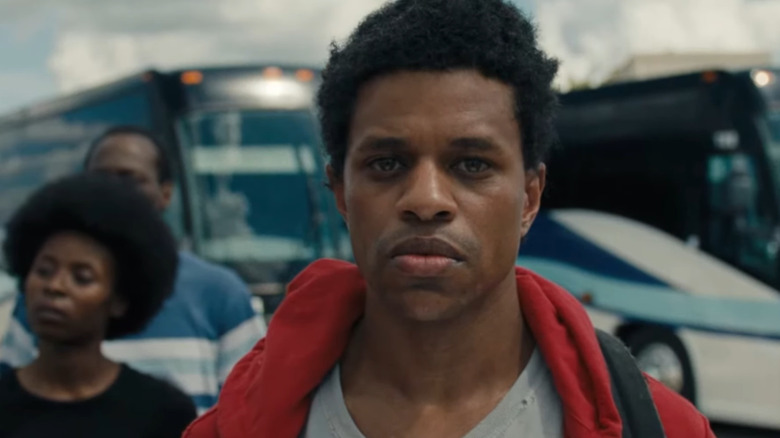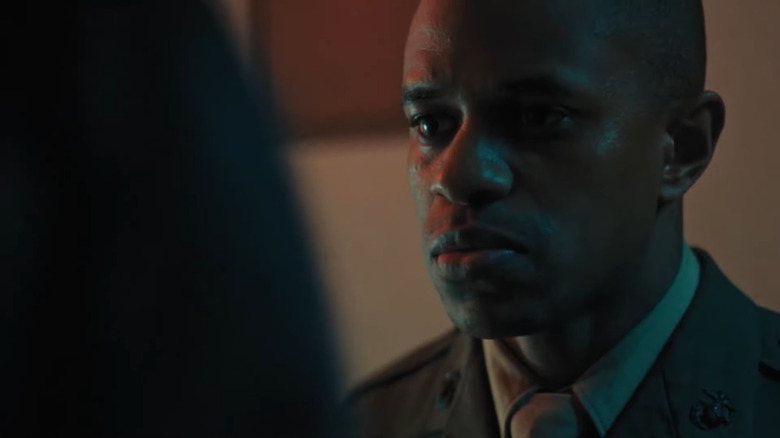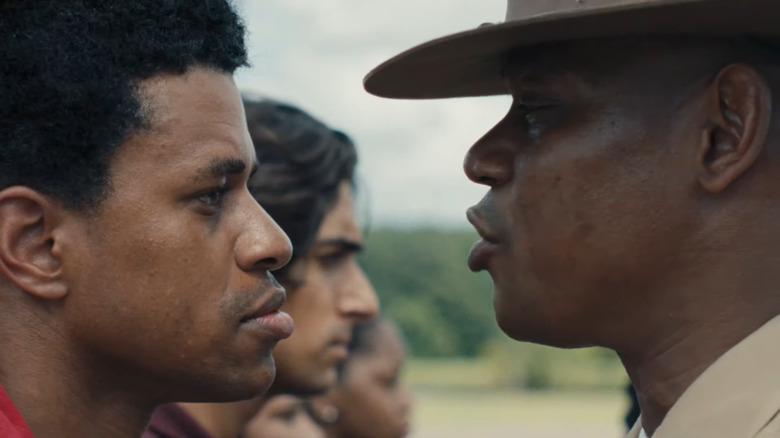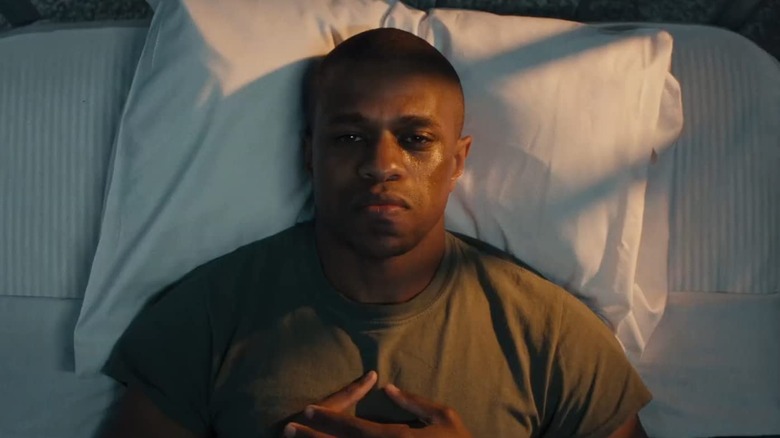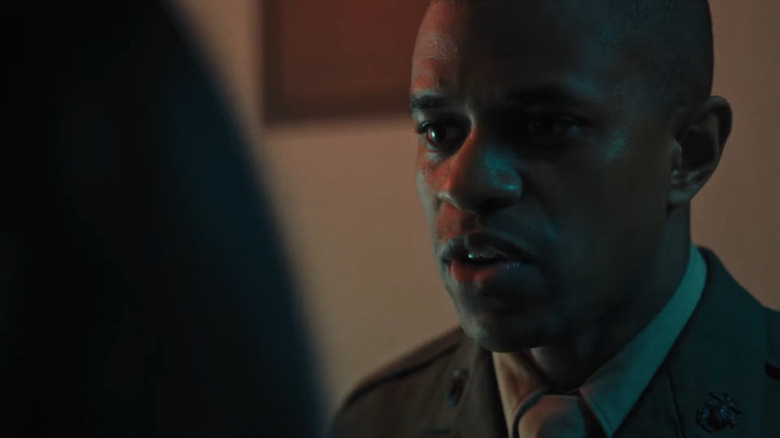For Jeremy Pope, The Inspection Was About Healing [Exclusive Interview]
"The Inspection" is a powerful, beautifully filmed drama written and directed by Elegance Bratton. It follows Ellis French (Jeremy Pope) as he joins the Marines in the early 2000s, seeing it as his only path towards escaping homelessness and reconnecting with his mother, played by Gabrielle Union. The largely autobiographical script focuses a lot on French's sexuality, and the difficulties that came with being a gay man trying to make his way through boot camp in this period of American history.
But as sharp as the script is, it's the performances from the movie's leads that bring it to another level. As /Film's own Chris Evangelista says in his review of the film, "Pope's performance is so raw, so honest, that we're with him every step of the way." I got the chance to talk to Pope about his experience acting in this movie, and the specific challenges that came with this sort of role.
'We're out here healing the people within this room'
What was your favorite, most memorable scene for you, filming this movie?
It was a hard scene to shoot, and I think I can say it's my favorite now — or more leaning into the most memorable scene. Me and Gabrielle Union, towards the end of the film where we're in the hallway. And I think why it's a memorable moment is because when I took this job, it was all about protecting Elegance [Bratton]. Because I know by him being so vulnerable and sharing his story, he was giving us — the world — a lot of him, and I know that can be very scary. I know that can come at a cost. So this day when we're shooting these things, me playing a version of him and Gabrielle bringing his mom back to life, the things that her character was saying to me were things that had been said to Elegance. And I remember when we were shooting the scene, I would look over and he was sobbing in the corner looking at the monitor, because what was happening is, he was healing.
He was just in a real moment. And the things were very real. There was no acting. There was no directing. It was just, we were in this space and there was a sensitivity to the scene. But I think why it's a memorable scene for me is because I knew that once we left that, the load he was carrying was a little bit lighter. Because he had said it and it was now on screen and he could move on. He could press forward.
I think knowing that we were able to gift him that, if anything, with making this film, I felt like we had done our job in protecting him and getting him to a safer place. So that would be one of my most memorable moments that felt like, "We're not acting, we're here doing soul work, and we're out here healing the people within this room." I got so much healing. Gab was so determined to get the scene right and she dug to a deep place to do that. This is not a role in which she has played before. So I just feel very grateful to have been a part of that and ultimately be able to give that piece of closure to Elegance.
'I don't have to over-explain to you, because you know exactly what this feeling is'
I know it was a very autobiographical movie for Elegance. Is that an extra challenge for you as an actor to be playing someone you know in real life, who you're interacting with as you're playing him?
Yeah. I think we did pretty good job of just identifying what that relationship was going to be and how we were going to move within that space. Because we read the script, we connected, and then we were just friends. We wanted to just be friends.
And then I know that there's a layer of "you're the writer, you're the director." There's a lot of places and spaces in which we'll move together, but we had to do it together, ultimately. One thing I'm very grateful to him for is, he allowed me to create my version of French. Early on he was like, "I don't need you to mimic me." You know what I mean? The words and the stories and the feelings are on the page, but he's given me an opportunity to explore and to find and to bring things to life in a way that he couldn't or he didn't know existed.
So within that, while I was telling French's story, ultimately Elegance's story, I was able to bring a lot of my own narrative and parallels to it. And I think that's what we see, or hopefully feel the most vibrant on the surface. I feel like there's so much work happening in scenes where there isn't any dialogue and it's just the feeling, it's that you're watching a queer director, writer, and a queer Black man share an experience together, and him going, "I don't have to over-explain to you, because you know exactly what this feeling is."
So what he's able to do is just capture it in a specific way. And some of those things that he lived, we didn't talk about. He was like, "The camera's on you, but this is what's happening in this moment." And he allowed me to just show up for that moment. So I'm very proud of us for finding the right dynamic and him ultimately trusting me with this story and portrayal.
'Why the Marines?'
I remember reading an interview where you talked about how you connected a lot with the character in the movie. And it got me thinking: What's something that you don't have in common with the character, that you had to work with?
I've never been homeless, I'll say that. I've never joined the service or been in the Marines. I think when I go back to the homeless moment, a lot of the conversations, because we're talking about a military film and there can be a lot of questions and concern about what that means, who's it for? Is it pro this is it pro that? But really ultimately asking Elegance, "Why the Marines? Why was that your journey?" And to get the knowledge that him being homeless for as many years as he was and the things he was seeing and experiencing on the streets in New York City, he was at his last ends.
He was desperate and he was going, "I'm a black queer man in statistics. Data is showing me that I'm going to die." You know what I mean? "This world is not safe. It's not cut out for my existence. The world does not protect me. My mother does not love me. So if I join the service, it will provide resources, some type of protection, food, a place to stay. And ultimately when I die, which again I know is going to happen, I'll have died in service and I'll matter to someone. I don't know who that someone is right now."
To get into that perspective of, that's how desperate he was to feel and be seen. So I think that's something that I've had my own parallels of needing someone to deem me worthy or feeling the need for someone to deem me worthy, but that homeless and not having a place of home and not having those resources was something I had to just have a lot of conversations with him about to just understand, God, how desperate you were for things. And then how you began to just grab things and take a step forward for where Elegance, and ultimately French, was.
Did you do have to any training for the movie at all?
We actually went through boot camp on camera, but really off camera. It was a lot of 3:00, 4:00 AM mornings, which is I guess what they do. And they wake you up, and I think the brilliant thing about where we were shooting — we shot in Mississippi, and we were shooting at a police academy, which was built to resemble kind of a Paris Island, like the Marine boot camp.
And we were able to go and watch people that were actively in the police academy, what they were doing, and just the training they were doing, which was very similar to boot camp and the Marine style of training. We had our consultants that were on the set with us. They were not actors, so they were very much on us to be like, "This is the way you stand." "Aye, sir. Yes, ma'am." Like to our background artists, to us, we created this dynamic of what it felt like and feels like to be on that soil and to be in training, and to be a platoon, and to be one. So it was, while a very emotionally driven film, or demanding, it was also extremely physically demanding. We were shooting in Mississippi in 117 degree weather doing these activities, if you will. So it just added another layer to the performance, I think, for all of us.
'He's able to offer light to other people, however that they identify'
There are a lot of scenes in the movie where your character isn't treated very well, especially by your fellow boot camp people. What was it like filming that? What were things like behind the scenes?
Yeah, I think for a lot of us, it was a job of service. We know that by us stepping into this truth in these painful and hurtful moments, we were setting Elegance free. And we ultimately knew by making a piece so authentically true in this way, that hopefully we would be offering a place of healing for someone out there who needs to see this film. Because one thing I think, while there are these hurtful things that happen and things that are said to French, he finds self-acceptance and self-love through his pursuit of joining the Marines. I think that is our happy ending. And the happy ending is Elegance has made a beautiful film and here we are opening at TIFF and closing at New York Film Festival, and what a gift. So I'm just so proud and happy for him, because that was the goal.
These things are hurtful and painful, but those are his truth, and a lot of time, the truth of Black queer individuals and how we have to navigate this world. I have my own parallels and experiences with that, but I knew that by us being vulnerable and talking about these things in our cast, being so sensitive to that and having the conversations and going like, "Bro, I really don't want to hit you, or I really don't want to say this to you." But again, it's his truth. It happened in this way and we know what the resolve is. It's Elegance getting free. It's someone going, "This film is a resource and it's tangible for me to know that I'm going to be okay." So that was why we had to step into those moments. That's why Gab had to dig deeper and step into this homophobic mother. You know what I mean? We all kind of had a job of service ultimately serving something bigger than us.
So, final question: What do you think message do you hope audiences take away from this film?
For my journey with French and what I hope, had this film had been around for me as I was stepping into who I am, to feel seen and loved and accepted and that it's going to be okay, I really hope this film speaks to someone in that way. And again, becomes a resource for someone who needs that reminder, needs that affirmation that you are enough and you've always been enough. This film isn't about someone who goes to the military and all of a sudden can do 12 pushups instead of two. It's not that. It's French looking around the room and going, "I've always had the strength. I've always known who I was and what I am." And what that means is you don't have to walk in the direction of people that don't serve you.
The more you step into your power and your truth — however you identify, whatever you believe — there is freedom in that. There is healing in that. And you will find a community of people who champion you for the version of who you are. I think to all my queer LGBTQIA+, this film is for us, it was made through us, about us, with us. I also think there's a universal message, because I think what we witness with French is that as he steps into his power, he's able to offer light to other people, however they identify. And I think that's just a word of be yourself, step into your truth, love on yourself, continue to do that, and know that you are more than enough.
"The Inspection" is playing in select theaters now and will have a wider release on December 2, 2022.
